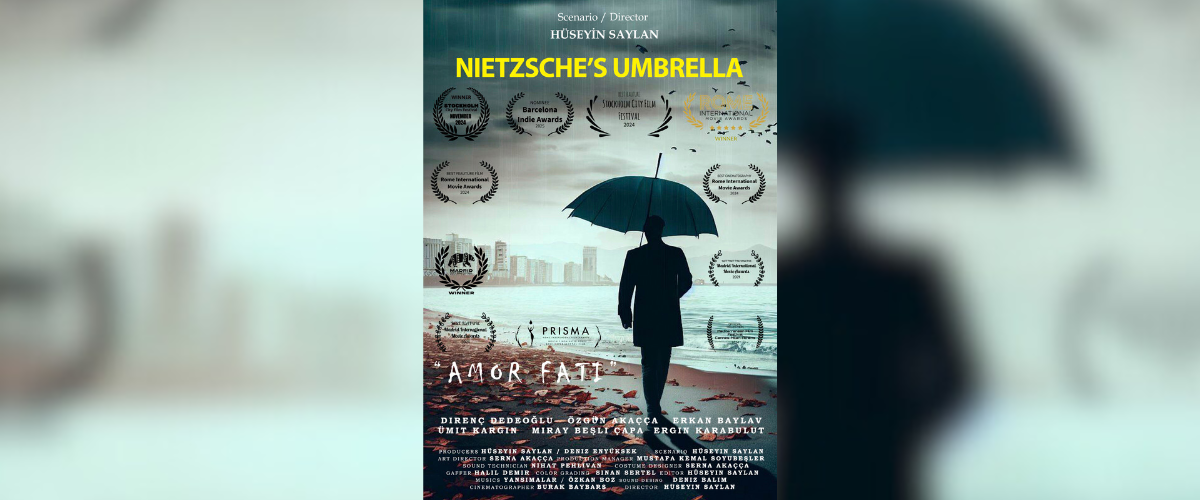
‘Happiness is not something that can be pursued and found. Happiness is not a consequence. Happiness is not sought. Let yourself go, son!’
How does one approach a film so complex that with each rewatch, something new is discovered? How does one contemplate a story with so many layers that it takes the Library of Alexandria and the sense and simplicity of the ordinary person to find them between the lines, the atmosphere, the attention to detail and the nuanced characters? What does a film made by an erudite filmmaker mean to the erudite (or the common) audience? In essence, ‘Nietzsche’s Umbrella‘ is as erudite as an art film can be – it provokes emotions, dilemmas and theories that stay with the audience for a very long time after they leave the theatres.
‘Nietzsche’s Umbrella’ is written and directed by Huseyin Saylan. It follows the story of Burak, a philosopher who has arrived at a crossroads – his translations of Nietzsche’s works don’t sell, his doctoral thesis needs more work as the jury is not impressed, his music career hasn’t hit off as dozens of labels have rejected his compositions, and on top of that, he feels like he’s suffocating with each next day spent in Istanbul. Meanwhile, Burak takes care of his blind uncle – an intriguing Borges who once owned a bookstore but now drinks his days away. If this wasn’t enough, Burak’s existential turmoil takes a turn when the situation with Burak’s two best friends, Altug and Serkan, becomes increasingly complicated. Altug and Serkan have engaged in illegal operations tied with the Russian mafia, while at the same time, Altug uses unconventional methods to avoid divorce for the sake of spending time with his son. Eventually, Burak, a nihilist (or not) by nature, must make a decision – for the first time in his life, he will face the music, or else.
As mentioned, the first thing to acknowledge regarding ‘Nietzsche’s Umbrella’ is the nuanced concept. Or, more precisely, the plethora of ideas that explore a wide range of meanings, subjects, purposes and messages. On the one hand, the film talks about a couple of central dramatic situations that work in cohesion with one another. The storylines intertwine subtly and directly – in some places, they drive the narrative forward energetically, and in other places, it takes attention and religious devotion to uncover the protagonist’s motivations, the underlying themes and the metaphors.
From Altug’s prisoners’ dilemma to Serkan’s ambitions and Burak’s passiveness, the film speaks to us in a language that we have yet to decipher. Like building a house of cards, it doesn’t take an impulsive move for all to fall apart – a gentle whisper or a soft blow is enough to destroy a world that’s been evolving since time immemorial. The curious viewer would try to point out the exact moment Burak, the protagonist, changes. Also, there’s the essential dilemma of whether he changes at all or he’ll linger on the same things that kept him entrapped. Saylan’s approach towards storytelling contributes to the overall genuineness. He takes risks that pay off in the long run. Burak is the quintessential anti-protagonist. In other words, he’s so passive for the majority of the film that the audience could easily mistake him for an episodic character, a fly on the wall that doesn’t interfere or move the plot forward whatsoever. Instead, it’s the secondary characters’ job to advance the storyline – Altug’s actions create a rift in the friends’ relationships. Then, once the story gravitates towards the crime angle, Serkan takes over, explaining the backstory and how he and Altug got here. It’s only when Altug and Serkan are out of the picture that Burak decides to act. This unconventional approach towards world-building and characterization might end in failure for nine out of ten filmmakers, but not for Huseyin Saylan, who has successfully managed to turn it into a strength, a unique selling point that sets ‘Nietzsche’s Umbrella’ apart from the crowd.
Moving forward, music is not only a plot device but an integral part of the narrative. In addition, the film has a memorable visual identity, supported by flawless editing that compensates for some of the shots that are out of focus or the sound design for some of the interior scenes. However, these are only finesse compared to the great job done overall. Let’s not also forget the cast – the three leading actors, with the accent on Erkan Baylav as Altug, have done a great job portraying their characters, making them organic and believable. The dialogue-driven scenes are executed nicely, with dynamic mise-en-scenes to support them. On the other hand, the execution’s shortcomings are in the second part, where the crime story surfaces and becomes the predominant plotline. The feeling is that Serkan and Altug’s business, their illegal activities in Moscow, and the fact that Burkan was involved in the business in its infancy are the parts that could’ve benefited from a more thorough presentation. They are covered in a hurry, which, considering the circumstances, is understandable considering that extending them could’ve resulted in a longer running time and hence larger budgeting numbers, i.e., extensive shooting days. A possible length extension could’ve made the transition from the heavy-handed existentialism to the crime drama plotline steadier and with fewer gaps to fill, especially when it comes to the backstories.





